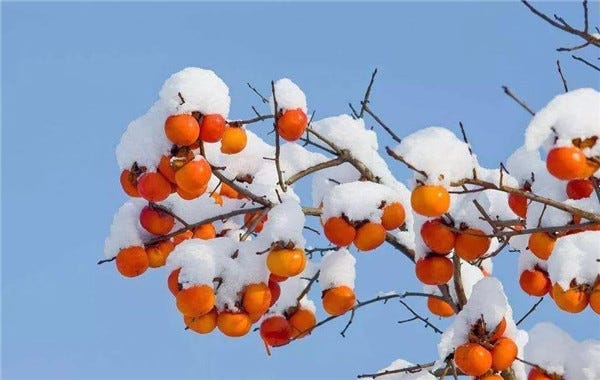Welcome to RealTime Mandarin—a multimedia resource to immerse you in the latest Chinese language trends, inspire you to practice and improve your Mandarin every week, and empower you to communicate with confidence.
Subscribe now to get the next issue straight to your inbox!
Winter in Chinese can be a metaphor for dark or difficult times, as it is in English. But Chinese winters seem darker and colder, as captured in this colloquial phrase:
冰冻三尺,非一日之寒 bīngdòng sān chǐ fēi yī rì zhīhán - It takes more than one cold day for the river to freeze three feet deep
According to media reports this week, it’s going to be a long winter for biotech companies listing in Hong Kong, which is discussed in Words of the Week below.
We also listen in to conversations with working people in China’s big tech firms on how they prepare for their end-of-year reviews.
Finally, in the Recommendations at the end we learn what you are if someone calls you a ‘pinchable persimmon’ in Chinese.
Enjoy, and stay warm!
1. CONVERSATIONS TO CONSUME
How to prepare for your end-of-year review
An article in 36Kr interviews young ’working people’ (打工人 dǎgōngrén) on how they are preparing for their end-of-year reviews.
It’s an entertaining and all-too-familiar read for anyone who has worked in or with Chinese companies.
What should you include in your report? What’s the format? How to present it? Look no further than these conversations. The summary captures it all:
他们有的要保留领导的夸奖截图等年终总结的时候用,也就是全年都在为最后的总结做铺垫;有的人深陷在内卷里,一个项目10个人,8个人在总结里写自己是leader;有的人写年终总结像是作文比赛,得奖的人还有红包拿;有的人因为年终奖在年终总结之后才发而惴惴不安;也有的人是职场老手了,年终总结里什么该说什么不该说,心里明镜似的。
Some people keep screenshots of complimentary messages from their boss to include in their year-end summary; it’s like their whole year’s work has been in preparation for this report. Some are caught up in ‘involuted’ internal competition; in a project of 10 people, eight of them are apparently ‘the leader’. Others produce their end-of-year report as if it were a writing composition contest, with the winners receiving cash prizes; some people are anxious because the year-end bonuses are issued after the year-end reports are presented. Whereas veterans in the workplace understand clearly what should be said and what should not be said in their end of year review.
There’s lots of must-have vocab in the interviews.
Useful words
严苛 yánkē - harsh
其实领导对年终在总结的要求并没有想象中那么严苛 - Actually, leaders don’t have as high an expectation on the end-of-year review as you’d think.
Related: similar in meaning but more ‘harsh’ than 严格 yángé, and about the same harshness as 苛刻 kēkè.
复盘 fùpán - ‘replay game’, meaning review, analyse and come up with a better way to do things
每周开会复盘,沟通频次更高,开会内容更聚焦 - Every week we meet and review. With higher frequency of communication, meetings are more focussed.
Background: fùpán, replay the game, originates from the Chinese game, Go 围棋 wéiqí.
很坑 hěnkēng - very annoying
还有一点很坑的是,大厂有PPT文化,要注意排版、图片,把PPT做得非常精美 - There’s something else that’s really annoying, which is in the big firms there’s [something called] ‘PPT culture’. You need to pay attention to formatting, images and make it look beautiful.
Related: 好坑 hǎokēng has a similar meaning. It’s related to 坑爹 kēngdiē, an Internet word, which means ‘make things difficult for your dad’. It’s a way to complain about someone who’s really annoying or done something to upset you. It was first used by gamers in chatrooms in the game, World of Warcraft (魔兽世界 móshòu shìjiè), before going mainstream.
她太坑爹了 - She’s so annoying!
More: 坑了 kēngle - hurt, done one over on somebody (see 2 October newsletter for more on this)
拉胯 lākuǎ - make a mistake at a critical time; ‘f*ck things up’
代表你这个人态度起码是好的,不能太拉胯 - At least it shows you’ve got the right attitude. You just have to make sure you don’t f*ck things up.
More: this is a northern Chinese dialect word which has gone mainstream. Its literal translation is ‘even my hip bones have been dragged to the ground’ and can mean ‘unreliable’ (不靠谱) or ‘make a mistake’ (出错).
Related: 掉链子 diào liànzi - ‘drop the chain’, another northern Chinese dialect word meaning the same thing.
歌颂 gēsòng - ‘singing an ode’ - to heap praise on somebody
我们年终总结有一个“格式”:开头抒情、中间复盘、结尾歌颂老板 - The end of year review has a set format: open with something emotional, do the review in the middle, and then say nice things about your boss at the end.
杆秤 gǎnchèng - a measure of somebody or something
汇报做得好坏,每个人心里也都有杆秤 - Everyone knows in their heart if they’ve done well or not at their end of year review.
Background: a gǎnchèng is a type of measuring scale used in China before electronic digital scales were adopted. In the structure, 心里有杆秤, it means ‘have a clear understanding of what is real’, or ‘to know in your heart’.





